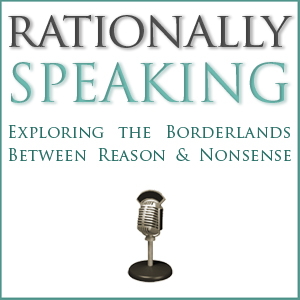Rationally Speaking #144 - Bryan Caplan on "Does parenting matter?"
Rationally Speaking Podcast
New York City Skeptics
4.6 • 787 Ratings
🗓️ 4 October 2015
⏱️ 63 minutes
🧾️ Download transcript
Summary
Transcript
Click on a timestamp to play from that location
| 0:00.0 | Rationally speaking is a presentation of New York City skeptics dedicated to promoting critical thinking, skeptical inquiry, and science education. |
| 0:22.6 | For more information, please visit us at NYCCEceptics.org. |
| 0:35.6 | Welcome to Rationally Speaking, the podcast where we explore the borderlands between reason and nonsense. |
| 0:41.8 | I'm your host, Julia Galef, and with me is today's guest, Brian Kaplan. |
| 0:45.9 | Brian is a professor of economics at George Mason University. |
| 0:49.1 | He's also a blogger for Econlog, and the author of many pieces for The New York Times, the Wall Street |
| 0:55.6 | Journal, the Washington Post, and also the author of the books, The Myth of the Rational Voter, |
| 1:01.5 | and Selfish Reasons to Have More Kids. |
| 1:04.1 | Brian, welcome to the show. |
| 1:05.6 | Thanks for much for having me. |
| 1:07.0 | So today we're going to talk about a counterintuitive message in Brian's more recent book, |
| 1:13.4 | Selfish Reasons to Have More Kids, as well as extensively on his blog. So the counterintuitive |
| 1:18.4 | message is for all the parents out there who are working hard every day to make sure that |
| 1:23.5 | their children grow up to be healthy, happy, and successful people. And in short, the |
| 1:28.8 | messages, stop trying. Your actions have far less impact on your kids than you think they do. |
| 1:34.3 | So today we're going to delve in to what that advice is based on and its implications for how you |
| 1:40.2 | should live your life. So, Brian, maybe we could set the stage by talking about why this advice is so counterintuitive. |
| 1:49.5 | Parents certainly seem to think that they can affect their children's life outcomes. |
| 1:55.2 | You talk a little bit in your book about how the amount of effort that parents put into parenting has gone up over the years. |
| 2:02.5 | Could you say a little about that? |
| 2:04.4 | Sure, yes. So sociologists have been measuring the way that people spend their time for about 50 |
| 2:08.4 | years now. And what's quite striking is that if you go and take a look at the 1960s, which is |
... |
Please login to see the full transcript.
Disclaimer: The podcast and artwork embedded on this page are from New York City Skeptics, and are the property of its owner and not affiliated with or endorsed by Tapesearch.
Generated transcripts are the property of New York City Skeptics and are distributed freely under the Fair Use doctrine. Transcripts generated by Tapesearch are not guaranteed to be accurate.
Copyright © Tapesearch 2025.

